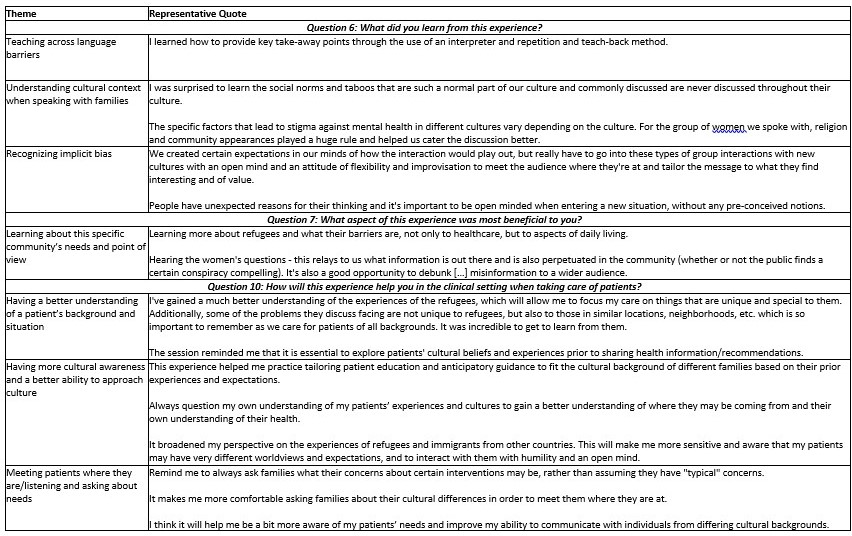Medical Education: Resident
Medical Education 7: Resident 2
542 - “I understand more”: Cultivating Residents’ Cultural Humility and Communication Skills Through Virtual Health Education with Local Refugee Women
Saturday, April 29, 2023
3:30 PM - 6:00 PM ET
Poster Number: 542
Publication Number: 542.229
Publication Number: 542.229
Lynda C. Aririguzo, Baylor College of Medicine, Houston, TX, United States; Aditi Gupta, Baylor College of Medicine, Houston, TX, United States; Karla Fredricks, Baylor College of Medicine/Texas Children's Hospital, Houston, TX, United States; Shelley Kumar, Baylor College of Medicine, Houston, TX, United States; Julika Kaplan, Indiana University, Houston, TX, United States; Ana C. Monterrey, Assistant Professor of Pediatrics, Houston, TX, United States

Lynda C. Aririguzo, MD, MPH (she/her/hers)
Assistant Professor of Pediatrics
Baylor College of Medicine
Houston, Texas, United States
Presenting Author(s)
Background: The ACGME requires all pediatric residency programs to teach their residents about cultural humility and communication skills. While traditional didactic modes of instruction may be easier to incorporate into a curriculum, experience-based learning activities may allow trainees to better develop these competencies through real-life interactions.
Objective: This study evaluates residents' perceptions of how a community health education experience affected their cultural humility and communication skills.
Design/Methods: Residents prepared and delivered a virtual one-hour health education presentation for refugee women in a local community group using an interpreter. Post-activity Likert scale questions assessed confidence and comfort of communicating and teaching across cultures and language barriers before and after the activity. Residents were also asked to reflect on what they learned during the experience and how it would apply to future patient care via free text response. Survey data was analyzed using Wilcoxon signed rank test while free text responses were analyzed for themes.
Results: Between July 2020 and June 2022, 106 residents participated in the activity. Residents (n = 78 with completed evaluations) reported increased confidence in recognizing and respecting cultural backgrounds (p < 0.001) and increased comfort teaching outside the health care setting (p < 0.001) as well as across language barriers (p < 0.001) after the activity compared to before it. Qualitative analysis of free text responses showed that the experience led to a better appreciation of cultural context when interacting with patients, improved recognition of personal implicit bias, and a heightened awareness of the importance of understanding a communities’ point of view. Additionally, reflecting on how the experience applied to clinical care revealed themes related to increased cultural awareness as well as the importance of listening to patients and asking about their needs.
Conclusion(s): This virtual experience-based learning activity helped pediatric residents gain a better understanding and awareness of the importance of culture and how to communicate with families whose culture is different from one’s own. This activity could be adapted and incorporated into various residency programs and could allow trainees to connect with community groups in geographically different locations.
.jpg)

